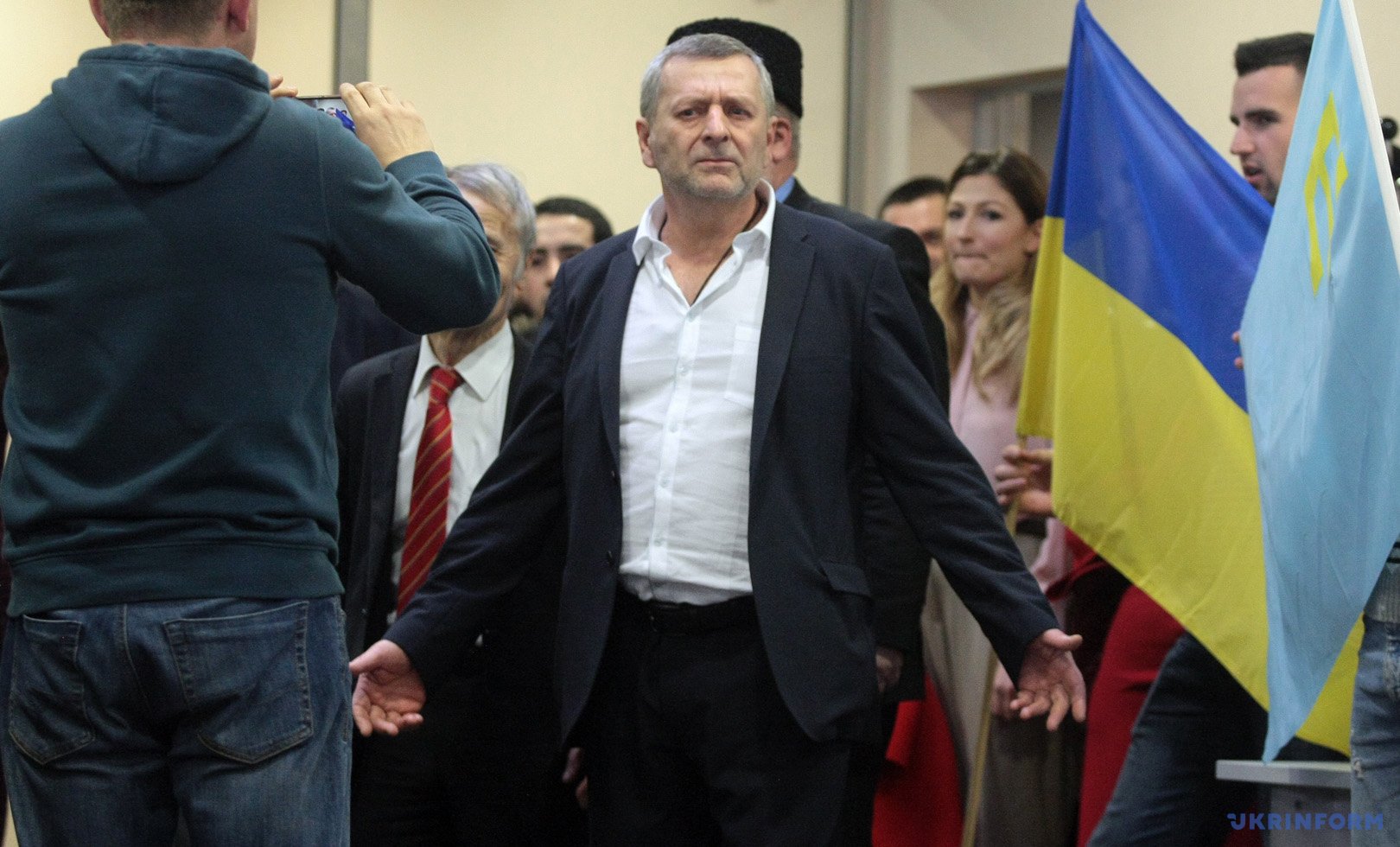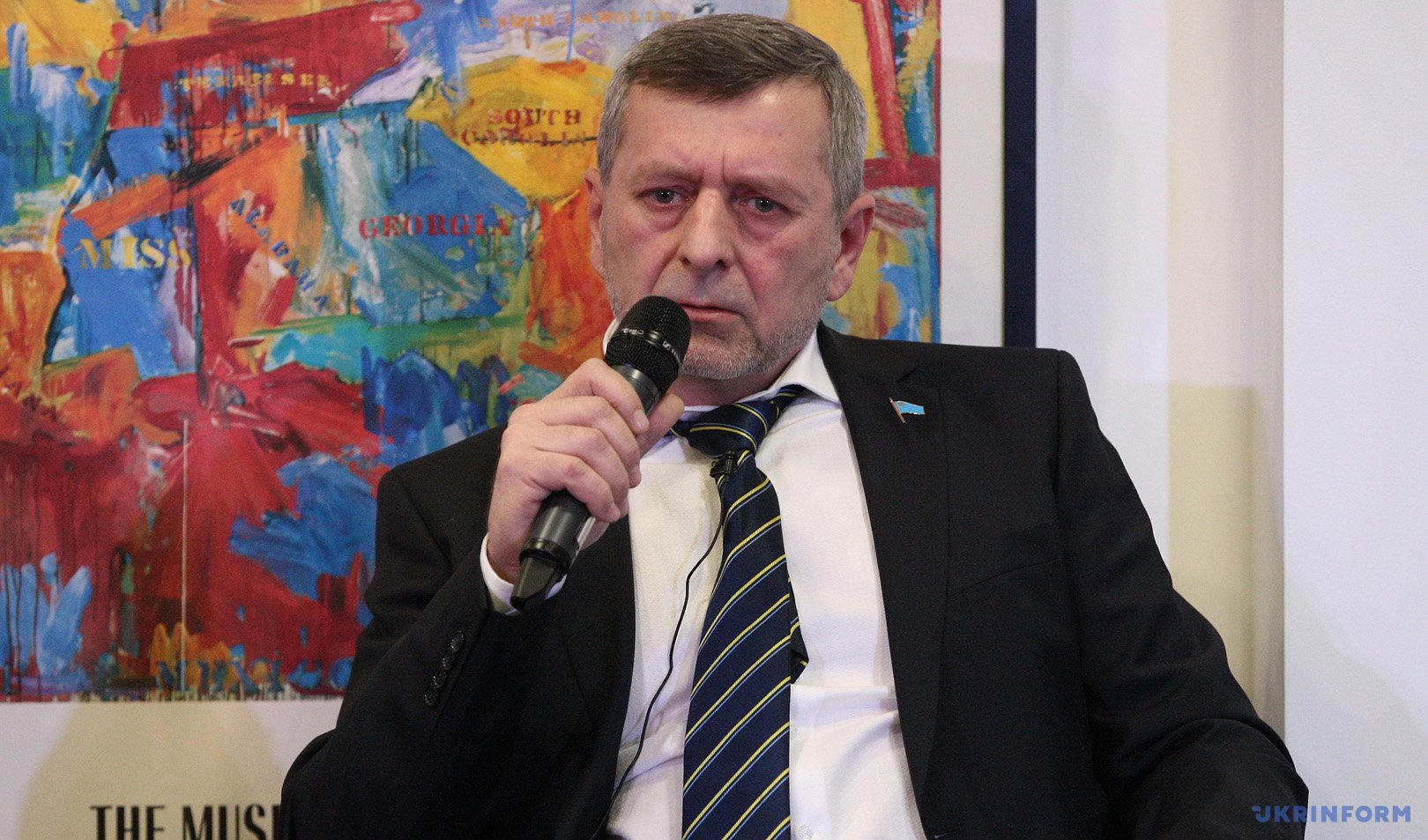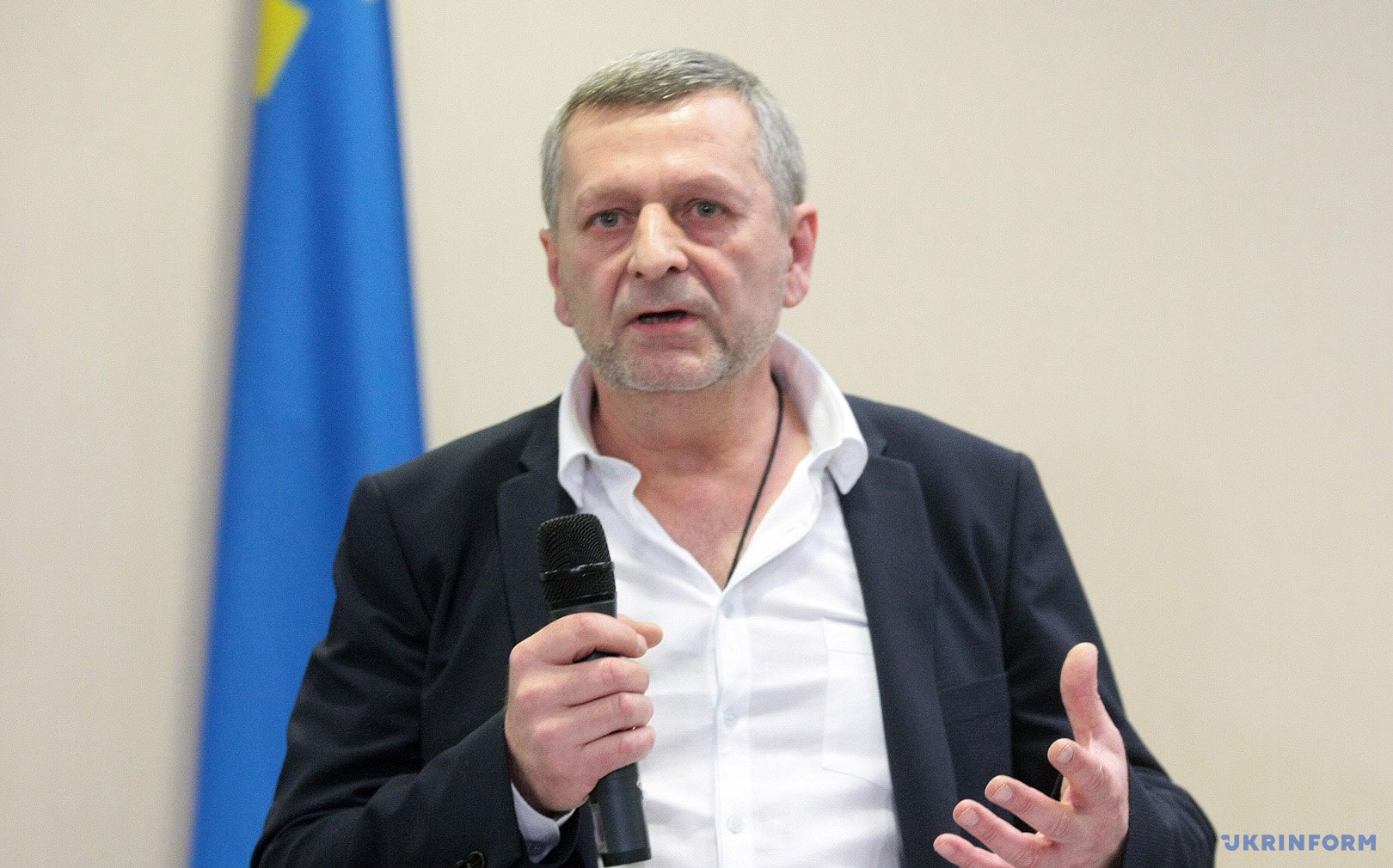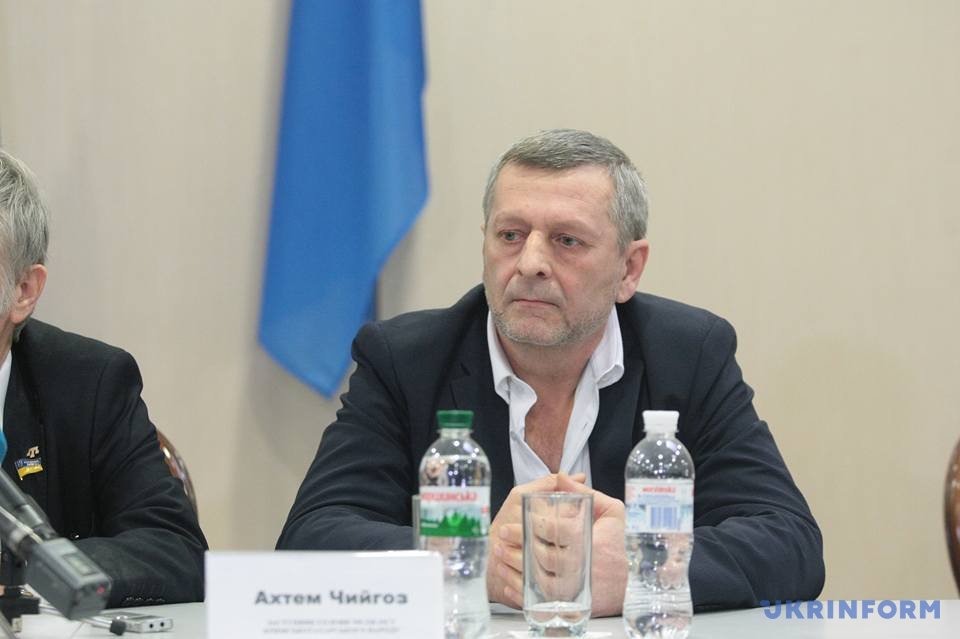Akhtem Chiygoz spent 1,001 days in prison. Neither many months of total loneliness, nor psychological pressure, nor inevitability of a court verdict on unproven guilt could make him give up loyalty to his principles, devotion to his people and country.
Chiygoz took an active position after his liberation - he tries to tell the world community about the true situation in Crimea, about the ways of de-occupation of the peninsula. Akhtem Chiygoz spoke in an exclusive interview with Ukrinform about his life in prison, what they offered for betrayal, and what helped him survive in incredibly difficult conditions.
Q: Akhtem, we are very pleased with your return and are grateful that you took a very active stance. You met with the secretary general of the Council of Europe. What did you talk about? Did you talk about de-occupation of Crimea?
A: Yes, that's exactly what we were talking about. I said at the meeting that it was necessary to work out and adopt all possible tools for de-occupation of Crimea, except for the military ones. I meant that the top priority is the protection of the population by international institutions, the work of observer missions, human rights organizations - only effective protection, not an attempt to give Russia an opportunity to present a picture in Crimea in its own way. There must be a very tough approach. I spoke about this at the meeting, that these missions should be long-term and cover all aspects of society in Crimea, including human rights and repression of political prisoners. This is terror against residents, when masked bandits break into homes and start throwing women and children on the floor, and children cannot even scream due to fear, they close their faces with their hands, because it all happens at 5 am, at 6 am. This is terror, and this is an attempt to recall the events of 1944.
Q: How were your words perceived? What issues did you discuss?
A: I also spoke about humanitarian problems. There's genocide against education in Ukrainian, Crimean Tatar. I'm talking about the fact that formally the [Russian] state adopted a law and uses it everywhere - that there are three state languages in Crimea, but in fact Russification is in full swing, schools are closed. The only Ukrainian lyceum is being reshaped. The Crimean Tatar language becomes the language of teaching in the form of a separate subject. All this is done systematically. Historical monuments are destroyed there. This all again is connected with the Russification of Crimea. We talked about this. We said that it was necessary to support the idea and promote the adoption of the status of the Autonomous Republic of Crimea, the national status, because this is also a very serious instrument and, incidentally, for the international community in the issue of de-occupation, when the role of indigenous people, according to international norms, comes first. And we also discussed a number of other things. In my opinion, they listened to me attentively and accepted these proposals with understanding.

Q: You did not take a break after release (even to restore health), and you drive a lot. How do you feel now?
A: I am convinced that all illnesses come from emotions. In prison I had the emotions that controlled my health. They depended on the attitude towards me in Ukraine and in the world. It inspired me. Of course, I have some sores.
But now for me these positive emotions are also important. Now I travel and meet people. Trips are tedious, but the result is more important. When I see that I have the opportunity to directly convey the grief that engulfed our country, our people and my compatriots, then I do not know where the strength comes from. If it is necessary for the people, I will do it.
Q: Where are you going?
A: Now the question is about trips to America and Turkey. And the city administration invited me to Chernihiv. If there is an opportunity, I will choose Chernihiv.
Q: How did you feel in prison? When you needed medical help, did they provide it? What were the conditions?
A: If you get sick in prison, you will not be offered anything other than aspirin or paracitamol, because there is nothing. It was always a sensitive issue.
The situation changed only the last two or three months, after numerous efforts of the lawyer, statements from the Ministry of Foreign Affairs, the arrival of [Ukraine's human rights commissioner] Valeria Lutkovska. President Poroshenko also made a statement, I thank him for that. As president, apparently, he was imbued with my struggle and appreciated it.
As far as detention conditions are concerned, for example, when people are convoyed, 30-40 people are driven in the morning into the so-called "gut" - a long corridor near the buildings where you stand for 2-3 hours in the water. Then they are put into prison vans and sent there to some courts, investigative committees. I was kept in the so-called "glasses" for several months. This is an 80x80 cm room, in which you cannot sit, stand, or turn around. There are bigger "glasses," in which 25-30 people can be placed. Everybody smokes there, and, of course, there's no ventilation, so people faint.

Q: Was it an attempt to incline you to cooperation?
A: Yes, it was. They offered money, posts, and used other methods to lure me. For example, they spoke about how the Crimean Tatars will start living under Russia. I said that the Crimean Tatars, firstly, have a very good historical memory - what Russia offered never ended well. Secondly, the Crimean Tatars are people who were brought up on values, and we voluntarily accepted the citizenship of Ukraine and voluntarily defended its territorial integrity since the collapse of the Soviet Union. Therefore, we cannot and will not change our views.
Then they told me, for example, that kindergartens are being built for our children. I answered that in these kindergartens they will most likely raise their grandchildren and children, as we will never need them. We were deported throughout the history of the Russian Empire, just like the Ukrainian people.
The topic of betrayal once arose in a conversation with one colonel, and he explained the situation to me so that he talked with those who betrayed the oath, that they followed their general, and that a military man must understand this. I asked him if he had a general. He said yes, then I clarified, to whom he swore an oath - to the fatherland or to the general? He did not say anything, shook my hand, and our conversation ended.
Q: What was the attitude of other prisoners towards you?
A: You know, they often showed respect and support. And even not to me, but to the fact that I hold the position and am not afraid to say about it.
For example, police officers said after the New Year and Christmas holidays, after I did not see anyone for two months: "Chiygoz, you became a people's hero of Ukraine there." About 30 people, including convicts and police officers, were present. I answered: "If the people of Ukraine consider me, a Crimean Tatar, to be their hero, then this is a great honor for me."
I knew that some of my answers could aggravate the situation, because I said something that is unusual or unpleasant for them, or irritates them, but I expressed my position.
Q: Did you receive any letters?
A: No, I was not given any letters. But there was one moment, which probably later underscored the changes. When the trial was underway, just two months before my release, I heard often from operatives that many letters came, but they were not given to me. Both the wife and the lawyer said that they write to me from around the world. I then began to ask them not to send letters through the detention center, but through the lawyers, through the Mejlis. I subsequently succeeded in reading some of them, and my soul rejoiced. All that inspired me directly, because the whole world - Australia, America, Canada, and European countries – knows about my struggle, about my position, not just Akhtem Chiygoz, but a citizen who is obliged to behave like that. I last received letters from Russia - Saratov, the Urals, Siberia. They wrote and asked me to forgive them for the fact that their country is at war with Ukraine, for the fact that Crimean Tatars are being terrorized, for the fact that Crimea was occupied.
Q: That is, people were not afraid to leave their return address.
A: Yes. The fact that people were not afraid already says that time is working against Russia. There are several articles there - non-recognition of Crimea as being part of Russia, violation of the territorial integrity of Russia. When I was not given letters, I still knew that they were being read, and the fact that they were reading them was already important. And when these letters were brought to me, I even asked Nikolai Polozov to come and I gave him to read these 5-6 letters. He read them. I asked him what he thought about it. He could not answer. I said: "It seems to me that they are already expressing their position."

Q: Our correspondent Roman Sushchenko is now staying in Lefortovo in Moscow. Remembering your imprisonment, perhaps you can give him advice or instruction how to hold on?
A: He should not give up, he should fight until the end. He should not look at the door. It's hard. At first I myself looked at the door, and I was almost out of my mind. You look and hope that this door will open every morning. It will be opened, whoever tries to lock it and insist that you have been imprisoned for a long time. This is also an element of psychological pressure, this is also torture, when they tell you monotonously that you will never get out of there if you do not do something mean, if you do not slander your country, friends. Everything begins with a trifle: first you slander yourself - this is the first step that you are weak, then you slander your friends who are called accomplices, according to the guilty verdict, and then your slander your country and your nation.
This pressure is not easy to withstand, especially in the first month, when the door is closed and no one is allowed to visit you during the first month. For example, no one was allowed to visit me for half a year. And I was also offered a lot of things to sign, just to get out of there.
Q: How did you manage to survive?
A: When people ask me what I was guided by at that time, I answer: "By shame." When you are ashamed to disgrace your people, your country, your friends, your children, then later, no matter how hard it is for you, you have the strength not to do some bad things. I said this to some people there. We have no right - we have a country behind us, we have people behind us. But some people, unfortunately, put their signatures in the first month.
Q: Akhtem, how did you manage to keep psychological health if you stayed alone for six months?
A: Even more than six months. I decided that in total I spent more than eight months alone. You could be alone for a few months, then they settle another stool pigeon for a month or two, but there is no result. They settle another one, and then you stay alone again for 2-3 months.
I then agreed with myself, and this, in my opinion, is the most difficult thing, because there are no answers to thoughts. So you need to agree with yourself. I succeeded, and I believe, this is because I withstood it, especially since I'm not young, and I'm considered old by the standards of the prison. Therefore, I asked everyone I saw there from among our so-called "saboteurs," "extremists" - many of them are young men – to look at me, "an old man," and to hold on. They said: "You hold on well." And I told them: "Are we supposed to fall here as much as to look bad and show that we need a pity? No. This way is the worst way."
Q: So you found the strength to support others and to stay in good shape as much as possible?
A: People entrusted me and elected me. I believed that my people should be proud that I represent it with dignity, including in prison. Therefore, I carefully prepared for the trial. I primitively cut my hair, shaved regularly, and kept my clothes clean. Sometimes I even joked about it, talking with Dzhemilev and Chubarov on the phone (after a long time, sometimes there was an opportunity to have a phone call). I told them that I did not stay there for a single day as "Akhtem Chiygoz." I also stay here and play the role of a representative of the Mejlis, because everyone is turning, everyone looks at you - prisoners, workers, the public from the street, and the world community. On the one hand, it certainly supports you very much, but, on the other hand, it imposes so much responsibility on you! Such attention only increases pressure.

Q: Was physical force applied to you?
A: No. Well, what does physical force mean? They cuff the hand behind the back, they throw your to the floor of a prison van, they grab you on both sides when they bring you to a courtroom. And your hands get blue because of these handcuffs. Your children are pushed away in your eyes, and you are forced to give an answer... What is it - "application" or "not application" of physical force? I just think that it's like a natural life of a prisoner.
Q: Was torture used?
A: When they ask me about torture, I give the following example. In jail, there is no need for someone to stuff anything somewhere. This is unlikely done in detention centers, because there are certain prison rules there. There are criminals, vagabonds, and thieves staying there. And every police officer also understands what the consequences may be. There are other things going on. For example, I was thrown into a prison cell for those sentenced to life imprisonment, and I spent a week there… However, I did not address the police or commanders, as I knew that when you complain, it already says that their methods are working.
Q: What did you see there?
A: I do not want to talk about this. And when it did not help, I was thrown into the "pit." It's even worse.
Q: What is it?
A: It's when they throw you into the basement, where even beds are fastened to the wall and they are unfastened only for the night. All day long you should sit on the concrete floor or stand. And you cannot stand at full height, because the ceiling is designed so there.
The most dangerous torture is psychological. Physical pain can be endured, when these handcuffs squeeze your hands, when they put a bag on your head, push you, humiliate your dignity. Humiliation affects your really hard. And you can withstand physical pain if you are a man.
Q: When did you realize that you want to be freed?
A: When we flew over the sea, I saw tiled roofs, minarets and mosques from the plane, and I realized that we are in Turkey. I thought that we would never be allowed to come to Turkey without Erdogan's permission.
Q: Did nobody tell you where you were going?
A: No. I was given a certificate of release, which says that I am accompanied home. At the same time, they put me into the car, and before that I had to be convoyed. Usually, everyone is taken to Krasnodar, where they are distributed, either to Yakutia, Siberia, the Urals, or elsewhere.
Q: Did you expect to be sent somewhere far away?
A: I did not expect. An FSB officer told me that I would be sent to the red zone, to Magadan. And it was not a threat, they just work like that.
Q: What does the "red zone" mean?
A: These are the most severe detention zones for prisoners. And for me this meant double redness, because I am a Crimean Tatar, political prisoner, who denies the guilt, does not recognize occupation.
Q: When you arrived at the airport, you understood that you will not be convoyed by plane?
A: The fact is that they came to me three weeks before that and said that there was supposedly an agreement to release me, but I had to sign some vile papers, and I refused. And after that I did not see them [those who came]. When I saw the plane, I was not surprised, because they could have invented anything they wanted. I was surprised that there was an ambulance vehicle there. I thought that now they would examine me and could not understand what would be next. But I did not ask anything. I did not ask anything before. After all, if you start asking, then you show concern. One of those accompanying me (without identification signs and in a balaclava) looked at me very closely, and I caught his eye and looked into his eyes. I recognized that he was one of those present when they kidnapped me on January 29, 2015.
Q: You talked about the papers that you did not sign. What were they about?
A: They say that I admit my guilt, I apologize, I ask for pardon. I threw these papers away, and I did not even have any emotions. If I wanted to be freed that way, I would have done it long ago, or maybe I would have not been imprisoned at all. So I said that they should think what they were offering. Then they told me that there is some kind of agreement between Erdogan and Putin. But I still refused to sign any papers, and they left. After that I did not have any information.
Q: When did you see Umerov?
A: When I was put on a plane. I was led by different special police officers, the level was different, they were dressed in white shirts, ties, etc. I think they were from [Putin's] presidential administration. And then I saw Umerov, and I realized that he was in the ambulance vehicle.
Q: How did everything go on?
A: Then we arrived in Anapa. If only in Kyiv, then why in Anapa? If we were going to Siberia, then it would usually be through Rostov. That is, you sit and think, but if you only think about it, you feel giddy. I have not seen people for almost three years, and then they put me on a plane. I just read a prayer. By the way, I did exactly the same in 2015, when I was kidnapped, when five or six individuals in balaclavas, without any identification signs, came in and shoved me into a minibus without license plates, and put a bag on my head. Then I prayed and asked the Almighty to give me the strength not to disgrace myself. I realized that if they want to kill me, then, of course, it will not be a quick death. By that time we found the body of Reshat Ametov. He was tortured.
Q: Were you afraid of death at that time?
A: No. And this is not about heroism or fearlessness. I endure physical pain, but, I do not know how the organism will behave. Do you understand? I asked the Almighty not to let my body fail me.
Q: Your example has become indicative for many people. You told me that the day of your liberation became a real holiday and raised the spirit of your compatriots in Crimea.
A: You see, society always focuses on some examples. I always say so - both scoundrels and heroes are a zone of social responsibility. People are looking for examples to follow, to make sure that society is properly educated, that it struggles in this situation, that young people could grow in new realities, with the correct perception of such notions as honor and dignity. Examples are needed to confirm this.
Therefore, I myself was brought up so that I had some kind of benchmarks. My father raised me as a man, and politically I always had an example of another father - it's Mustafa Dzhemilev. Therefore, in the most difficult moments, I, of course, remembered that he was in prison, what he was telling. In this regard, there were even funny moments. For example, he [Dzhemilev] has always said that it is easier after two years. After two years now, I'm sitting on the bed, looking around and thinking: "Is it easier?" (smiles).
After my release, they told me that our [Crimean Tatars] visit each other, like on New Year's Day, and congratulate each other on the liberation of Chiygoz. That is, they said and believed that Chiygoz would never be released, and then it turns out that they released him.
Olha Budnyk, Strasbourg
